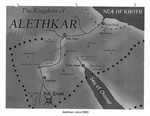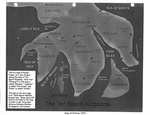Brandon Sanderson
Endpapers
The endpapers were one of the things that we weren't certain whether we'd get into the final book or not. Tor was iffy on paying for them, as they add a large expense to the novels. In the end, Tor stepped up because they believed in the project, for which I am very grateful.
These are one of the last things we finished, and it took several tries to get them right. I knew I wanted them to be in-world pieces of art–things that are supposed to have been created by artists living within the world of Roshar. The front endpapers are murals crafted from stone and gems fitted together, and the back endpapers are stained glass. But the tones and the exact look of the images took some time to get right. (For a while, the symbols of the various magics on the first one had gemstones overlaying them. That turned out to look bad on the page. Perhaps when Peter is putting this up, he can grab those old drafts and post them beneath here.)
The first one of these is the one I'll talk about the most, the design that outlines the magic for Roshar. (Well, some of the magic.) This design is one of the very first things I developed for the art of this book, way back in 2001. The "Double Eye," as the people in world would call it, is a connection of ten elements.
I avoid elemental magic systems. I feel they're overdone. However, one of the concepts of this world was to have a theology that believed in ten fundamental elements instead of the ordinary four or five. A focus would be on them, and on the ten fundamental forces—the interplay between the two being a major factor in the magic, the philosophy, and the cosmology of the world.
Well, that's what these twenty symbols represent, with each of the larger symbols being a Radiant element. The smaller symbols are the forces. You can draw a circle around one element and the two forces that connect to it, and you have one of the orders of Knights Radiant.
For example, top right is the symbol for air—with the symbols for pressure and gravitation connected to it. The Windrunners.
Peter Ahlstrom
Indeed, there was a lot of swapping around at the last minute to get everything working right with the magic. This is actually why the Way of Kings audiobook gets the Ars Arcanum chart wrong—it was using a version that was messed up between rounds of changes.





